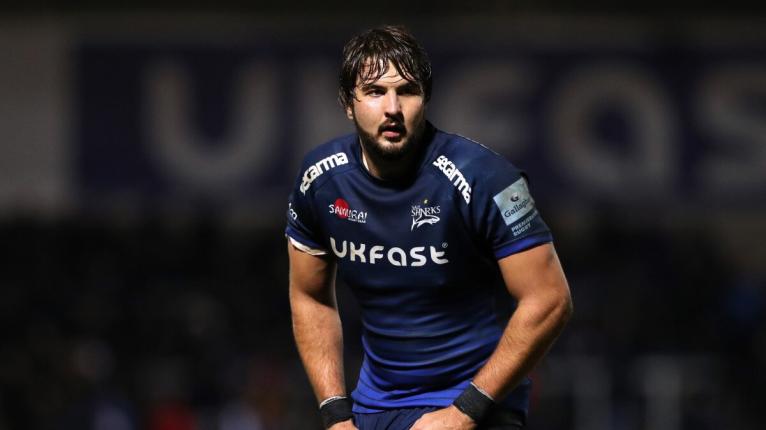'I dislocated a shoulder while jackalling and I probably don't go in as much now because of the injury'

Sale Sharks forward Josh Beaumont knows all about the dangers of jackalling for the ball and carries the scars of the surgery that was needed to repair his dislocated shoulder.
How to protect players who are exposed to heavy hits as they try to win breakdown possession has become a major debate in the sport following Jack Willis’s serious knee injury suffered when he was dragged from a break down by a crocodile roll in England’s win over Italy.
Beaumont has only just returned from a 12 month enforced break from the sport after three operations to repair a knee that was damaged when he crashed to the ground at a line out and as he prepares to put his body on the line against Harlequins tomorrow, the former Sale captain admitted his style of play as been tempered by painful experiences.
Beaumont said: “I dislocated a shoulder while jackalling a ball and I probably don’t go in as much now because of the injury. It wasn’t a crocodile roll just a collision in that area but it is does play on your mind and while I am not an out and out ball stealer – it’s not my role in the team – you know there is an increased risk of injury in that area of the game. But, I don’t believe you can take jackalling out of the game completely.
“Guys like Tom and Ben Curry have worked hard to become world-class in that area and it is a skill. It would be slightly unfair to take it away from those players. It is the toughest part of the game in terms of who to reward and it is all factored around player safety which is important particularly with contact with the head and the danger of concussions. We may have to look at the crocodile roll and the rates of injury.
“Last March I was involved in the discussions about the breakdown and how it was going to be interpreted and it was tricky for the guys after lockdown to get up to speed. There were a lot more penalties given and it is clear now that you will be penalised for not rolling away.”
With Ireland’s Peter O’Mahony and Scotland’s Zander Ferguson both sent off in the Six Nations for making contact with the head of an opponent as they drove at speed into a ruck, this has only served to focus even more attention on the collision aspect of the sport and the need to protect vulnerable players. Beaumont added: “If the players had wrapped their arms and made that clearing out motion and shown good intent that takes away a red card situation.
“It is difficult in the heat of the moment when you are trying to win the ball and getting the technique right starts in your training work. There are conversations about what happened to Jack Willis and your view can depend on what position you play.”
'It’s painful when someone weighing 130kg runs as hard as they can at someone else'
'The Clamp' @will_evans69 tells @JLyall93 ??? why he had to change his jackaling style, talks Jack Willis injury & fears of brain damage at rugby's brutal coal facehttps://t.co/tv07DNr7S5
— RugbyPass (@RugbyPass) February 18, 2021
Beaumont, 6ft 7ins, used to being the “go to man” in the Sale Sharks line out which made his year-long absence following knee surgery a problem they failed to cope with but all that has now changed with return of Lood de Jager, the World Cup winning Springbok lock giving the club a transformational trio of South African targets.
Despite his own height, Beaumont, son of former England captain and World Rugby chairman Bill, is no longer able to look down on his teammates following the arrival of the tallest player in the Gallagher Premiership JP du Preez at 6ft 11ins closely followed by de Jager 6ft 9ins and then Cobus Wiese at 6ft 6ins.

Beaumont, de Jager and Wiese are on duty at Harlequins tomorrow where third place Sale need to bounce back from a loss to Bath and Beaumont said: “It is a nice change of neck position to be looking up at teammates rather than down! From a line out point of view it is good to have more options and that kind of height in that area of the game. We can be more successful than we have been in the past and it is an area where we have spent more time working on it.
“Last year we tended to have just one prime jumper where most teams would have two and so we had to adapt. It was then a case of building confidence back up in our line out drills and that is where we are now. Coming back after a lengthy lay off one thing I have noticed is that referees are more strict on contact in air and jumping across the line and a few years ago you would have got away with things. You have to be extra cautious now and it’s about knowing who is going up in the air in a defensive line out and use it as a weapon.
“A team like Quins want to play with a high tempo and try to get the ball in and out of the line out quickly and we may have to adapt on the day to stop that source of attack.”













